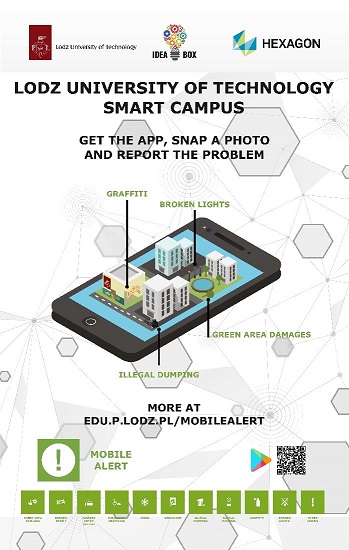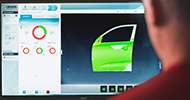Lodz University of Technology is a Well-Established, Renowned Higher Education Institution in Poland
The Lodz University of Technology, with its four campuses, more than 16,000 students, and more than 2,500 personnel, is rated among the best universities of technology in Poland, according to the 2019 Perspektywy magazine. The university plays an important role in increasing the competitive edge of the region, as well as contributing to the national and international economy.
In addition, the university has been recognized as supporting the highest number of students studying abroad in Poland. Considering the size of the campus community, it’s critical that mobility is prioritized to optimize time and resources for everyone. Luckily, officials have been successful; Lodz University of Technology was awarded with the title of “Mobility Friendly University” in Poland by the National Erasmus Agency.
Taking the Title ‘Mobility Friendly University’ to the Next Level
In 2019, the University Rector, Professor Sławomir Wiak, Ph.D., D.Sc, who oversees all university business, spearheaded a new technological initiative to make the campus a “smart campus.” But, what exactly did a smart campus mean to him? Wiak wanted to gain insight from the students, employees, and even local citizens to make sure the university was providing the best and most professional facilities to the academic family.
The scope of the project included all four campus locations spanning 80 acres and including 20,000 students, teachers, and university guests. The project also aimed to support the local community using the university’s park.
Because both Hexagon and the university are part of the city’s cluster of information and communication technology (ICT) companies, Wiak chose to work with Hexagon to achieve a smart campus. He contacted Product Line Director Marek Brylski of Hexagon’s Geospatial division to discuss ways Hexagon could support the initiative.
The university selected Hexagon’s Mobile Alert to achieve its goals. Mobile Alert is a ready-to-use solution consisting of a cloud-based portal for organizations and a freely downloadable mobile app for community members to allow organizations to gather, organize, and manage crowdsourced information.
Students, faculty, and staff can download the Mobile Alert app for free from the Google Play Store and Apple’s App Store. With the app, they can report incidents or situations, and the university receives the submissions through configurable menus that officials have customized for their needs.
The university started with 11 incident categories, so they can gather data on improving:
- Issues at greenspaces
- Broken lights
- Broken benches or other campus property
- Gated parking lot problems
- Illegal parking
- Disabled access issues
- Winter issues, such as ice on pavement
- Vandalism
- Graffiti
- Illegal dumping
- Other
Anyone on campus property can select a category, snaps a photo, and optionally make a comment. They can remain anonymous if they choose. The GPS location is automatically sent with the submission, then the university can manage the submissions and make appropriate responses.
Educating students, faculty, and staff about this new tool was important for its adoption. Wiak took the initiative himself and wrote all students and employees an email to tell them about Mobile Alert and encourage them to download and use the free app. It was advertised on the university website and intranet, in newsletters, and departments were encouraged to spread the news to students and colleagues. It was constantly promoted on their social media platforms. Posters were distributed to every department, and large signs were erected in the campus’ heavily-traveled areas. Even national and local media took interest and discussed the university’s efforts.

What Happens Next: Acting on Smart Campus Data
To close the information loop, the university publishes all submissions and their status on its website. That way, the users know that what they are doing is working and the information they are providing is contributing to the overall health and constant improvement of the university.
After the system was implemented, the university discovered that the most common issue was illegal parking that was blocking passages or damaging greenspaces. University lawyers are now proceeding with legal solutions to improve the situation and provide clear rules (and fines).
The administration was ecstatic with the results, which increased their awareness of problems. Now, officials can fix these issues in a more organized and timely fashion with proper prioritization, and everyone feels more informed.
Visit our website for more information on Mobile Alert. If you’re interested in joining our Community and becoming a part of the Hexagon family, please visit our Hexagon Community website. You can check out the ideation board, get the latest announcements, meet industry peers, and join in on geospatial technology discussions.















